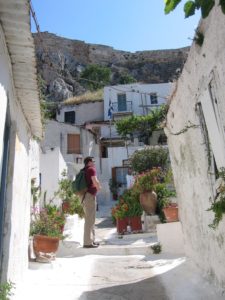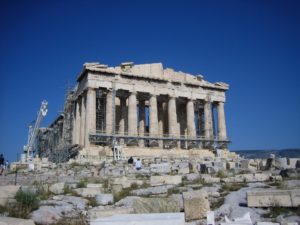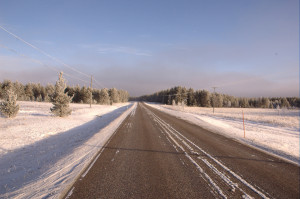One of our travel books called it “the less-straightforward but more interesting route,” which was all we needed to know. Of course we would go that way. There was no need to confer, even as extra-considerate newlyweds. We were, after all, celebrating what could certainly be described as a “less-straightforward but more interesting route” to marital happiness. Why opt for the utilitarian route now?
It was Day 2 of our honeymoon, and the route we chose was true to its description. Winding dirt and smooth clay paths led us uphill through a neighborhood of plaster-covered homes, crowded together all hodgepodge, like blocks set in place by a toddler. In some places, the walkway was close enough to the homes for me to touch the lace curtains fluttering in screenless kitchen windows, not that I dared to—just walking by made me feel apologetic for encroaching on what most Americans would label “personal space.”
 But we were not in the U.S. There were no wide lawns or privacy fences buffering personal space from public. Instead, we could smell garlic and lemon wafting from windows, and hear the bang of a wooden spoon on the side of a pot, the voice of a woman calling to a child, and the mysterious foreign chatter of a television show.
But we were not in the U.S. There were no wide lawns or privacy fences buffering personal space from public. Instead, we could smell garlic and lemon wafting from windows, and hear the bang of a wooden spoon on the side of a pot, the voice of a woman calling to a child, and the mysterious foreign chatter of a television show.
We walked by dogs lying lazily on shaded stoops, never tied up but also not interested in us; only their eyes moved in the heat of the day, keeping watch as we passed. Brightly-colored laundry was hung out on lines in narrow alleys between the homes, coordinating with bright pink and red flowers planted in pots and window boxes.
As the path continued to switch-back and fork every-which-way, it became clear the travel book Jason carried was no help. “Do you think we’re still on the right path?” I whispered, hoping to avoid being an “annoying tourist.”
“We’re still going up, so that’s a good sign,” Jason whispered in response, with a grin. I smiled inwardly at how automatically my writer’s mind turned everyday comments and experiences into metaphor. Are we on the right path? We’re still going up! Anything is better than being stagnant and stuck. Life is a journey. What happens along the way can be more important than the final destination!
It was all so cliche, but how could I resist? I was on my honeymoon, celebrating the hope rooted in a second wedding after years of feeling stuck and deciding that marriage—the whole idea of it—wasn’t for me. Now I was exploring new lands with someone who made every step one of companionship and possibility. I was able to be in the moment, both to feel seen and to look around and enjoy what I saw—to consider who I was in that place and time, rather than living in desperate impatience for the faint idea of what I thought my life would be.
* * * * *
Just when I felt certain we were lost in the maze of quaint domesticity (which certainly isn’t the worst place to be lost, metaphorically or actually), we spotted a sign propped in someone’s garden, hand-lettered with the word “Acropolis” and an arrow.
 Something about its complete lack of official pomp and grandeur made us laugh out loud (and take photos). I imagined a man making the sign, perhaps at the request of his wife who had long grown weary of confused, insensitive tourists calling out to her while she hung laundry or watered her flowers: “Excuse me, is this the way to the Acropolis?” The sign communicated that wry note of impatience, but also one of pride, as if to say the people who lived their everyday lives along the way to this magnificent site fully understood the value of this treasure they had to offer the world. If tourists walked daily by their windows to get there, so be it.
Something about its complete lack of official pomp and grandeur made us laugh out loud (and take photos). I imagined a man making the sign, perhaps at the request of his wife who had long grown weary of confused, insensitive tourists calling out to her while she hung laundry or watered her flowers: “Excuse me, is this the way to the Acropolis?” The sign communicated that wry note of impatience, but also one of pride, as if to say the people who lived their everyday lives along the way to this magnificent site fully understood the value of this treasure they had to offer the world. If tourists walked daily by their windows to get there, so be it.
Soon after passing the sign, we emerged from the jumble of garlic-sauteing and television-watching and dog-napping. We could see the Acropolis ahead. Having taken the “more interesting route,” we arrived at the back entrance of the fifth-century BC site, passing through the Theatre of Dionysus, where people were setting up a very modern sound system for a performance that evening.
We climbed further, up and out, toward the Parthenon looming above. Its ancient structure was partially engulfed by scaffolding, perhaps marring the view as seen through the eyes of a romantic, but also pointing to the reality of the architecture’s age and value; it had weathered much, and was worth meticulous preservation and care.
Jason and I stood silently side by side, taking it in, struggling to grasp the weight of history, the span of time lying between us in that moment and all that had come before—in our small lifetimes and for centuries and generations back. Then we walked on, ready to see what was next.
***


